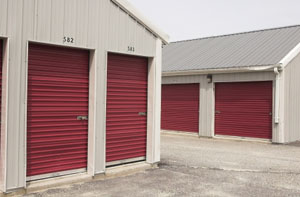Home >> Mini Storage Tips >> Storing Your Car, Boat, or RV at the Self Storage
 People who do not have a garage, or simply do not have one that is large enough, often seek
the aid of mini storages to store extra large valuables such as cars, boats, or
recreational vehicles (RVs). This option is appropriate for those wishing to store valuable vehicles
like these, if the self storage facility allows these types of items to be stored at their particular
location. Most mini storage facilities allow them to be stored as long as the person storing
them signs a statement indicating that they want (or do not want) optional
self storage insurance
for these
items and another contract stating that they will not hold the facility liable if the vehicle is damaged
or stolen. The manager (or unit salesperson) will then advise the customer of the optional services,
amenities, and fees involved with storing a valuable vehicle (or extra large valuable in general).
People who do not have a garage, or simply do not have one that is large enough, often seek
the aid of mini storages to store extra large valuables such as cars, boats, or
recreational vehicles (RVs). This option is appropriate for those wishing to store valuable vehicles
like these, if the self storage facility allows these types of items to be stored at their particular
location. Most mini storage facilities allow them to be stored as long as the person storing
them signs a statement indicating that they want (or do not want) optional
self storage insurance
for these
items and another contract stating that they will not hold the facility liable if the vehicle is damaged
or stolen. The manager (or unit salesperson) will then advise the customer of the optional services,
amenities, and fees involved with storing a valuable vehicle (or extra large valuable in general).
Where Can I Store My Vehicle Within The Self Storage Facility?
Some self storage facilities that allow a boat, car, or RV to be stored at their location also offer
some type of parking for the stored vehicle. Others allow the vehicle to be stored directly in the unit,
providing it is large enough to allow the vehicle to be safely entered and exited, without damage to
the vehicle or the unit. If the customer is storing a vehicle that must be towed, some mini storages
allow the trailer that the vehicle is brought in on to be stored as well. For those storing a boat,
this is usually essential, as boats cannot generally be stored without use of a trailer. Self storages
often have parking lots designated particular for the storing of vehicles, or certain units that are
designed with these valuables in mind. Storing larger vehicles, or vehicles on trailers, may require
the use of a larger unit or perhaps multiple parking spaces in a parking lot.
Mini Storage Rooftop Parking
Other mini storages offer rooftop parking for valuable vehicle storage or for storing
large vehicles. This type of storage will normally include more or at the least, more enhanced security
options, and at times, the vehicle must be moved during a certain time or on a particular day for security
reasons. For some self storages this includes signing the vehicle in and out, having proper identification,
such as a driver's license or other identification card that includes a picture of the individual, to access
the vehicle, requiring a code to be input to enter the parking lot or gate, and other optional measures.
If additional assistance is needed with the vehicle, there is sometimes an on-site manager available to offer
aid to customers. At some facilities, customers must advise management staff ahead of time if they wish to
move the vehicle, or vacate the facility, in order to prevent accidental damage or a misunderstanding due
to the manager not knowing the person moving the vehicle.
Other Options For Storing Your Vehicle
For those who are not able to find a mini storage location that allows a boat, RV, or car to be stored,
other businesses sometimes offer parking or storage for these vehicles. These businesses often allow
storage for a larger fee, however, and do not always offer the same types of security measures that a
self storage can offer. Customers can check the yellow pages of the phone book or research the Internet
for storage options in a specific locality or at a certain price.
Summary
Whether your garage is not large enough to store your valuable vehicle or you just do not have a garage
in general, self storage facilities can be a great option for storing vehicles such as
cars, RVs, and boats. These mini storages are available in a wide variety of sizes and locations, and
many offer climate-controlled units for the protection of the vehicle. One thing to remember before
storing any vehicle is to ask if these vehicles are allowed in the unit, and, if so, how much insurance
should be carried in case of loss or damage.
|